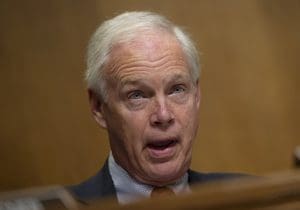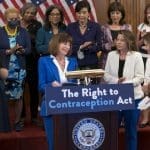GOP senator who voted against federal aid shrugs off coronavirus deaths
The Wisconsin Republican said potential death from the coronavirus should be ‘a risk we accept.’

Sen. Ron Johnson (R-WI) tried to downplay how bad the impact of the novel coronavirus will be, and in the process showed his science skills are not up to speed.
In an interview with the Milwaukee Journal Sentinel, he suggested that the social distancing measures being taken to stop the spread of the virus are overblown.
“I’m sure the deaths are horrific … I’m not denying what a nasty disease COVID-19 can be, and how it’s obviously devastating to somewhere between 1 and 3.4 percent of the population,” Johnson told the Journal Sentinel.
“We don’t shut down our economy because tens of thousands of people die on the highways. It’s a risk we accept so we can move about. We don’t shut down our economies because tens of thousands of people die from the common flu,” Johnson added.
Using Johnson’s logic, even if just 1% of the 329 million people living in the United States died of COVID-19 disease, that would be 3.29 million deaths. If 3.4% of the American population died, that would be a staggering 11.2 million people.
Johnson didn’t acknowledge that even if people don’t die of COVID-19 disease, the American health care system cannot withstand an influx of millions of sick people needing ventilators and beds in intensive care units.
A fear of overloading the country’s health care system is a big reason why social distancing measures have been put into place, an effort described as “flattening the curve.” If the spread can be slowed, the health care system will better be able to handle the number of severe cases of COVID-19 disease.
Not only is Johnson publicly downplaying the threats the coronavirus poses, he’s also voted against helping the millions of people losing income and even their jobs while social distancing measures are in place.
Johnson was one of eight Republicans to vote against a coronavirus relief bill on Wednesday that provides free testing for the coronavirus disease, offers paid family and sick leave, and beefs up food assistance and unemployment benefits.
Published with permission of The American Independent Foundation.
Recommended

Biden campaign launches new ad focused on Affordable Care Act
Former President Trump has said he wants to do away with the popular health care law.
By Kim Lyons, Pennsylvania Capital-Star - May 08, 2024
Ohio doctors fear effects of emergency abortion care case set to go before U.S. Supreme Court
A federal law that allows emergency departments to treat patients without regard to their ability to pay will be under U.S. Supreme Court scrutiny this week, and Ohio doctors are concerned about the case’s local impact on emergency abortion care.
By Susan Tebben, Ohio Capital Journal - April 23, 2024
House GOP votes to end flu, whooping cough vaccine rules for foster and adoptive families
A bill to eliminate flu and whooping cough vaccine requirements for adoptive and foster families caring for babies and medically fragile kids is heading to the governor’s desk.
By Anita Wadhwani, Tennessee Lookout - March 26, 2024


















































































